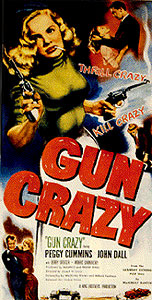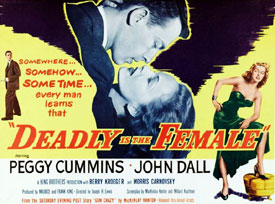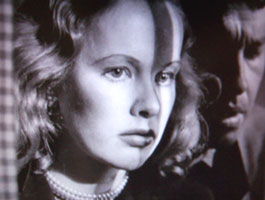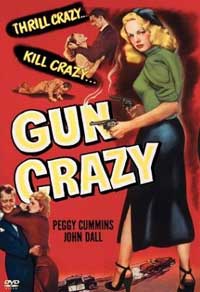 HHigh contrast black & white cinematography of Russel Harlan lends Gun Crazy; aka, Deadly is the Female (1950) a defining film noir beauty.
HHigh contrast black & white cinematography of Russel Harlan lends Gun Crazy; aka, Deadly is the Female (1950) a defining film noir beauty.
The script was co-written by the socially conscious & very talented Dalton Trumbo during the blacklist era, so credit went only to Millard Kaufman, who didn't write it at all, along with Millard Kantor who wrote the original scenario.
Since he was a lad, Bart (Russ Tamblyn) was obsessed with guns. He grew up more or less the All American Boy, but reached manhood (now played by John Dall) never changing the feeling in his heart that all he ever wanted to do was shoot.
Annie Laurie Starr (Peggy Cummins) was a carnival sharpshooter. Packy (Berry Kroeger) hires Bart as part of the act. When these two gun-nuts meet, it's love at first sight, but the two of them together will turn out to be a little different than the sum of them apart.
Annie realizes Bart's a good guy through & through. She tells him, "I got a funny feeling maybe I want to be good. I don't know if I can. But I'll try, Bart. I'll try." Alas, good intentions are not enough, & she quickly corrupts him.
 They get married & for a while life is idyllic. But neither of them are much for regular jobs, & eventually they're busted flat in Vegas. They get married & for a while life is idyllic. But neither of them are much for regular jobs, & eventually they're busted flat in Vegas.
They take to the Bonny & Clyde lifestyle. Their first crime is filmed in a very famous long one-take in an actual bank in which no one was informed what was up; the scene is worth replaying two or three times!
Bart can never fully adapt to Annie's sociopathic disposition. "Why do you have to kill them?" he pleads. "Why can't you let people live?"
It's hard to know if the director completely understood how some of this is funny this all is, but the grin-worthy moments in no way hinder the dark romantic wickedness of it all. The devotion of Bart & Annie to one another is beautiful to see, but their amoral decision-making processes make them seem very immature.
Superficially she's the bad one & he's merely weak-willed & easily influenced. Most critics over the years have alleged that she destroyed a good man in typical femme fatale fashion, but this pounds a story of true love into a much more ordinary film noir scenario, & that's really not what's going on.
 Bart alone feels guilt for their terrible acts. Bart's stronger sense of right & wrong makes him the greater criminal. He had choices Annie seems never to have had. Bart alone feels guilt for their terrible acts. Bart's stronger sense of right & wrong makes him the greater criminal. He had choices Annie seems never to have had.
She'd kept her true nature under wraps before Bart came along, & it could be argued it was he that destroyed her life. Above all, there's a mutuality of their demented but often very moving devotion to one another.
Their final flight from justice & the encounter with Bart's childhood friends Dave & Clyde (Nedrick Young & Harry Lewis) in the misty swamp becomes a nihilistic confrontation worthy of the gloomiest samurai movies.
As filmed in Madera National Part, it's all rather intense stuff, atmospheric, fearful, desparate. Though visually uneven, many shots are photographically sophisticated & artful.
With a B budget, director & writers were left to their own devices, without studio interference, or they might not have been able to do so much more than simple exploitation. It's much closer to Greek tragedy than "crime doesn't pay" or "femme fatales will destroy your life" Hollywoodisms.
The gritty story with the "heroes" being the bad-guys was a rare thing to film in 1950, & the result would inspire some of the best cinema verite crime films in France for the rest of the decade. Years later with the filming of Bonny & Clyde (1967), Faye Dunaway as Bonny would be wearing Annie Laurie's beret.
This important, & endlessly entertaining film, has been issued on dvd in beautiful condition, with a commentary track that is for once authentically worth listening to.
copyright © by Paghat the Ratgirl
|

